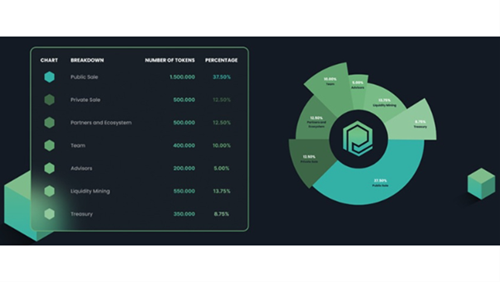Digital assets are slowly taking over the world, and new technology and systems are developed daily to meet the demands of its continuous growth.
Innovations like DeFi, Blockchain, and so on have been developed. We will look at Petrousus Token (PSUS), Solana (SOL), and Uniswap (UNI), which have been designed to meet the growth of the crypto industry.
Petrousus Token (PSUS)
Petrousus Token (PSUS) is a new addition to the cryptocurrency market that has developed a solution to a big issue facing DeFi – The inability to transfer data or assets between several chains.
The difficulty in scaling up DeFi is the issue that puts a cap on its potential. The problem that DeFi is currently facing can be readily solved. For the fact that every transaction that takes place on a blockchain needs to be recorded, the number of transactions that a user can carry out is restricted if the user is not registered on any of the blockchains.
Petrousus Token (PSUS) allows transactions between different blockchains and will increase seamless communication.
The troubles plaguing DeFi, which is vital to consumers due to the access it makes available, are being addressed by Petrousus Token (PSUS) through the utilization of the services.
Uniswap (UNI)
Uniswap (UNI) is a platform that allows its users to trade ERC20 tokens without the need for an intermediary such as an exchange or order book.
Most cryptocurrency-related dealings are executed on controlled exchange platforms such as Coinbase and Binance. These firms have complete control over the platforms, and customers are required to deposit their money in accounts that the companies control. In addition to that, before carrying out any transactions, they use a time-tested order book system.
Uniswap (UNI) uses an algorithmic equation that determines the swap rate by considering both tokens’ current balances in addition to the actual demand for the pair of tokens to be exchanged.
The problem of liquidity, which plagues the majority of traditional markets, is addressed with Uniswap (UNI). This was achieved through the utilization of automated liquidity provisioning. A decentralized exchange (DEX) can trade ERC20 tokens without relying on buyers and sellers to provide liquidity if it uses Uniswap (UNI).
Solana (SOL)
The Solana (SOL) project has set its sights on resolving the blockchain industry’s three most pressing problems. This highly functional project uses a permissionless and fast layer-1 blockchain that has not been explored before.
It is a decentralized platform that is safe, secure, quick, and inexpensive for both users and developers. Transactions processed using Solana (SOL) are split up and carried out among several distinct nodes. This ensures that your financial dealings cannot be tracked and are kept confidential.
In principle, the Solana network can process over 65,000 transactions per second without any scalability solutions being implemented.
Solana (SOL) has given itself the mission of addressing the challenges presented by blockchain technology, specifically decentralization, scalability, and safety. It is well known that software developers will typically choose to focus their efforts on one of the other two options because there can only be a maximum of two benefits associated with each option.
Conclusion
Solving the issues surrounding digital assets’ use, the technology that arises each day keeps growing to better the ecosystem and make it easier for more people to join the crypto community.
Rohingya sing Myanmar anthem 5 years after exodus
What life as engineer can mean for girls
Flash mobs boost anti-coal mining protests in India
DH Toon | BJP, AAP try to one-up each other
New space telescope shows Jupiter’s auroras, tiny moons
National
Karnataka
Bengaluru
Sports
Business
Multimedia
Opinion
Entertainment
Sisodia claims BJP asked him to join party
Lathi charge on streets of Patna
Why India is silent on Salman Rushdie
DH photo galleries
DH Picks
Latest stories
Trending news
Download DH APP
Services
Our group sites
Download DH APP
We use cookies to understand how you use our site and to improve user experience. This includes personalising content and advertising. By continuing to use our site, you accept our use of cookies, revised Privacy Policy.
We use cookies.
Author
Administraroot

